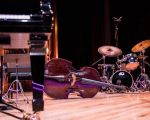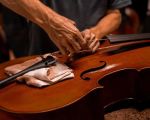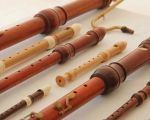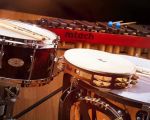- Why Choose an Electric Piano for Your Home Studio
- Key Features to Look for in an Electric Piano
- Top Electric Pianos for Home Studios
- Considering Budget and Quality
- How to Choose the Right Electric Piano for Your Needs
- Benefits of Having an Electric Piano in Your Home Studio
Why Choose an Electric Piano for Your Home Studio
Setting up a home studio is an exciting project for musicians, composers, and producers. Whether you’re an aspiring artist or a professional looking for a more convenient setup, an electric piano is a great investment for your home studio. Unlike traditional pianos, electric pianos offer a variety of benefits that make them ideal for home use, such as versatility, portability, and a range of features that can suit different styles and preferences.
One of the key reasons to choose an electric piano for your home studio is space. Traditional pianos are large, expensive, and difficult to move, making them less practical for smaller living spaces. Electric pianos, on the other hand, come in compact designs that are easy to set up and use in any room. They can also offer a wide range of sounds, effects, and connectivity options, giving you much more flexibility than an acoustic piano.
Moreover, electric pianos provide a quieter solution for practicing and recording. Most models come with headphone inputs, allowing you to play without disturbing others. This is especially useful in a home environment where noise could be an issue. The modern features of electric pianos also make them easier to integrate into digital recording setups, ensuring you have all the tools you need to create high-quality music.
Key Features to Look for in an Electric Piano
When choosing the best electric piano for your home studio, there are several important features to consider. Each feature plays a vital role in ensuring that the instrument meets your specific needs, whether you’re a beginner or an experienced musician. Below are the key aspects to focus on when making your decision:
1. Sound Quality
Sound quality is one of the most important aspects to evaluate when shopping for an electric piano. A high-quality electric piano should closely mimic the sound and feel of an acoustic piano. Look for models with advanced sound engines and a wide range of voices, so you can explore different genres and musical styles. Some pianos even offer the ability to layer multiple sounds, which can enhance your compositions and performances.
2. Key Action and Touch Sensitivity
Another essential feature is key action. The feel of the keys greatly impacts your playing experience. Choose a piano with weighted keys that simulate the touch and response of an acoustic piano. This is particularly important for pianists who want a more authentic playing experience. Touch sensitivity is also critical—it allows the piano to respond dynamically to the force of your playing, making it easier to create expressive performances.
3. Connectivity
For musicians who work with digital audio workstations (DAWs) or other music production software, connectivity is key. Look for electric pianos with USB or MIDI connectivity, which makes it easy to connect to computers or recording equipment. Some models also offer Bluetooth connectivity, which is convenient for wireless integration with other devices.
4. Portability and Size
If space is limited in your home studio or if you plan to take your piano to different locations, portability is an important consideration. Many electric pianos are lightweight and compact, allowing you to move them with ease. A portable piano is also convenient if you need to take it to gigs or rehearsals.
5. Additional Features
Many modern electric pianos come with additional features, such as built-in speakers, headphone outputs, recording capabilities, and even integrated learning modes. Some models offer apps or software that help with learning and practicing, making them an excellent choice for beginners or those looking to improve their skills. Consider these extra features based on your individual needs and how you plan to use the piano in your home studio.
Top Electric Pianos for Home Studios
Now that you know what features to look for, here are some of the top-rated electric pianos that are perfect for home studios. These models offer the best combination of sound quality, performance, and versatility:
1. Yamaha P-125
The Yamaha P-125 is a popular choice for home studio musicians. It features a realistic key action, high-quality sound, and an impressive selection of voices. The weighted keys replicate the feel of an acoustic piano, and the digital features allow for easy connectivity with recording software. It’s also compact and affordable, making it an excellent choice for those looking for a high-quality piano without breaking the bank.
2. Roland FP-30X
The Roland FP-30X is another top-rated electric piano for home studios. Known for its rich, authentic sound and responsive key action, the FP-30X offers a wide range of sounds and effects, perfect for both practice and performance. The piano is also lightweight and portable, making it ideal for musicians on the go. With its Bluetooth connectivity and user-friendly interface, the FP-30X is a fantastic option for those looking to integrate their piano with digital recording setups.
3. Korg B1SP
The Korg B1SP is a great choice for beginner pianists and home studio musicians who want an affordable yet high-quality electric piano. With its excellent sound quality and realistic touch, it’s an excellent introduction to digital pianos. The B1SP is also compact and comes with a stand and pedals, providing everything you need for your home studio setup.
4. Casio Privia PX-160
The Casio Privia PX-160 is another great option for those who want an affordable, feature-packed electric piano. With a full-sized, weighted keyboard and impressive sound quality, the PX-160 delivers an authentic playing experience. The slim, lightweight design makes it easy to transport, and its impressive range of sounds and connectivity options make it a great addition to any home studio.
5. Nord Piano 4
For professional musicians looking for a premium option, the Nord Piano 4 offers top-tier performance, stunning sound quality, and a robust set of features. Known for its high-end stage pianos, Nord’s Piano 4 offers amazing versatility with its multiple sound engines, effects, and performance features. It’s a fantastic choice for those who need a professional-grade piano for their home studio.
Considering Budget and Quality
When selecting an electric piano for your home studio, it’s essential to find a balance between quality and budget. While high-end models like the Nord Piano 4 offer exceptional sound and features, they may not be necessary for all musicians. If you’re just starting out or are on a tighter budget, there are plenty of mid-range options that offer excellent sound and performance without the steep price tag. Models like the Yamaha P-125 or the Roland FP-30X provide great value for money and are perfect for home studio setups.
Consider how often you plan to use the piano, whether you need portability, and what features are most important to you when making your decision. Keep in mind that investing in a quality instrument will pay off in the long run, as it will improve your practice experience and overall sound quality.
How to Choose the Right Electric Piano for Your Needs
Choosing the right electric piano depends on several factors. Start by determining your needs: Do you prioritize portability, sound quality, or additional features? If you plan to use the piano mainly for practice, an affordable model with a weighted key action may be sufficient. If you’re recording or performing, you may want to invest in a more advanced model with additional connectivity and sound options. Whatever your needs, there’s an electric piano that’s perfect for your home studio.
Benefits of Having an Electric Piano in Your Home Studio
Having an electric piano in your home studio offers numerous benefits. It provides an easy and accessible way to practice, compose, and record music, all from the comfort of your own home. With modern features such as connectivity, recording capabilities, and a range of sounds, an electric piano can enhance your music production and help you achieve professional results. Plus, it’s much more space-efficient than a traditional acoustic piano, making it a practical option for small studios.
If you’re ready to take your music to the next level with an electric piano, check out Beat Trigger for the best selection of pianos and home studio equipment. Whether you’re a beginner or a seasoned professional, the right electric piano can transform your musical journey.








